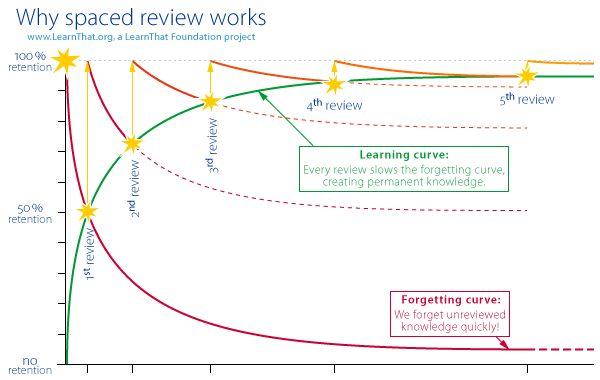
2 minute read
Desirable difficulties
5b. Spacing: is another good revision technique This involves learning a little information regularly, rather than trying to learn a lot in a single day. Recent research has found that the use of spacing resulted in a 1 0% to 30% difference in final test results compared to students who did lots of cramming. Spacing out your revision gives you enough time to forget previously learnt information, meaning that when this information is re-visited and re-learnt it is more likely to be transferred to your long-term memory (see the idea below about the forgetting curve)
5c. Interleaving: This involves you mixing up the topics you have studied within a given subject. Recent research has shown how effective this technique is: while students who ‘blocked’ their learning (the opposite to interleaving) performed to a higher level when tested immediately after learning the information, those who used interleaving performed more than three times better if the test was more than a day later. So it’s better to jumble up your learning within a subject instead of focussing solely on one topic at a time and block studying that. So, in Geography instead of studying Hazards one day and then Carbon Cycle the next, there is a significant benefit in approaching it by reviewing continental drift and plate tectonics interveleved with the importance and processes of the carbon cycle. In Biology topics such as cell structure, transport across membranes and protein synthesis are fundamental and will be the most useful to keep reviewing. So you would keep revisiting these and interleaving them with more difficult concepts such as the control of the cardiac cycle and investigating diversity. This way you are more likely to see connections between topics.
Advertisement
5d. Spaced practice and the Forgetting Curve: Spaced practice is based on research that shows distributed learning over time is far more effective than last minute cramming. Critical is the delay between this learning –it mustn’t be so long that the original information has been completely forgotten. Unfortunately, how long this gap should be is a tough question to answer. The speed at which we forget something will depend on many factors such as the difficulty of the material, how meaningful it was to us, how we learned it and how frequently we relearn or remember it. What the last factor tells us is that when we learn something for the first time, we need to review it quickly afterwards (this is usually one of the points of homework). The more times we force ourselves to remember something, the longer the gap can be between reviews, which the diagram below illustrates nicely.






